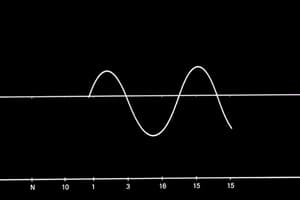Podcast
Questions and Answers
What does Quantum Mechanical Transition State Theory (QM TST) provide that makes it more suitable for studying reactions with low activation energies?
What does Quantum Mechanical Transition State Theory (QM TST) provide that makes it more suitable for studying reactions with low activation energies?
- Is based on macroscopic observations
- Uses empirical data exclusively
- Focuses on molecular diffusion
- Accounts for small deviations from classical behavior (correct)
What is the primary benefit of using the method that allows scientists to observe individual reaction events?
What is the primary benefit of using the method that allows scientists to observe individual reaction events?
- Reduces the need for experimental data
- Provides information unperturbed by molecular diffusion (correct)
- Excludes kinetic data
- Speeds up the reaction process
Why do students often struggle with understanding chemical kinetics?
Why do students often struggle with understanding chemical kinetics?
- Challenges related to quantum mechanics
- Difficulty in implementing experimental techniques
- Misconceptions regarding the role of catalysts (correct)
- Confusion about molecular structure
What do recent formalisms offer in terms of describing and predicting the behavior of complex systems?
What do recent formalisms offer in terms of describing and predicting the behavior of complex systems?
How does chemical kinetics contribute to understanding chemical systems?
How does chemical kinetics contribute to understanding chemical systems?
What is a distinguishing feature of Quantum Mechanical Transition State Theory (QM TST) compared to classical theories?
What is a distinguishing feature of Quantum Mechanical Transition State Theory (QM TST) compared to classical theories?
What is the main focus of chemical kinetics?
What is the main focus of chemical kinetics?
Why is chemical kinetics important in various fields?
Why is chemical kinetics important in various fields?
Which mathematical models are used in chemical kinetics to describe reaction rates?
Which mathematical models are used in chemical kinetics to describe reaction rates?
What are elementary reactions in chemical systems?
What are elementary reactions in chemical systems?
How do molecules' collision rates change at elevated temperatures and pressures?
How do molecules' collision rates change at elevated temperatures and pressures?
What recent technological advancement is mentioned in the text for studying chemical kinetics?
What recent technological advancement is mentioned in the text for studying chemical kinetics?
Flashcards are hidden until you start studying
Study Notes
Unraveling Chemical Kinetics
Chemical kinetics is the branch of chemistry that focuses on the rates at which chemical reactions occur and how these rates are influenced by factors such as temperature, concentration, and the presence of catalysts. It is a quantum-mechanical, yet experimentally based, subject that allows us to understand and predict the behavior of chemical systems.
Why Study Chemical Kinetics?
At elevated temperatures and pressures, molecules collide more frequently, leading to increased reaction rates. This makes chemical kinetics essential for explaining and interpreting phenomena in diverse fields like gas dynamics, environmental pollution, and pharmacology.
Mathematical Models of Reaction Kinetics
Chemical kinetics employs mathematical models, such as the law of mass action and transition state theory, to describe reaction rates. These models help chemists and engineers develop tools to better depict and potentially control a broad range of chemical processes.
Elementary Reactions and Complex Pathways
Elementary reactions are the most basic processes that occur in chemical systems. They are described mathematically using collision theory and can be reduced to chains of elementary reactions. Complex pathways, such as those involving cooperative interactions, can also be described using chemical kinetics.
Recent Technological Advances
Atomic-resolution electron microscopy has emerged as a powerful tool to study chemical kinetics. This method allows scientists to observe individual reaction events and provides information on the frequency of events unperturbed by molecular diffusion. It has been used to study the kinetics of reactions like cycloaddition and has led to a better understanding of mechanistic insights.
Quantum Mechanical Transition State Theory
Quantum mechanical transition state theory (QM TST) provides a more accurate description of the behavior of a single molecule during a chemical reaction. This theory accounts for small deviations from the classical behavior of molecules, making it more suitable for studying reactions with low activation energies.
Student Conceptions and Challenges
Students often have difficulties in understanding the concepts of chemical kinetics. Research has identified numerous alternative conceptions related to reaction rates, catalysts, and the interplay between kinetics and thermodynamics. Effective teaching techniques help students overcome these conceptions and develop a deeper understanding of chemical kinetics.
Unified Picture for Complex Reactions
Recent research has suggested formalisms that yield a unified picture for cooperative-like reactions, making it easier to describe and predict the behavior of complex systems. These formalisms can be applied to a wide range of chemical processes and offer stronger mathematical control over reaction kinetics.
In summary
Chemical kinetics is crucial for understanding chemical systems and predicting their behavior. It combines mathematical models with experimental data to describe reaction rates and the factors that influence them. Recent technological advances and research into student conceptions have led to a deeper understanding of chemical kinetics and its applications.
Studying That Suits You
Use AI to generate personalized quizzes and flashcards to suit your learning preferences.



